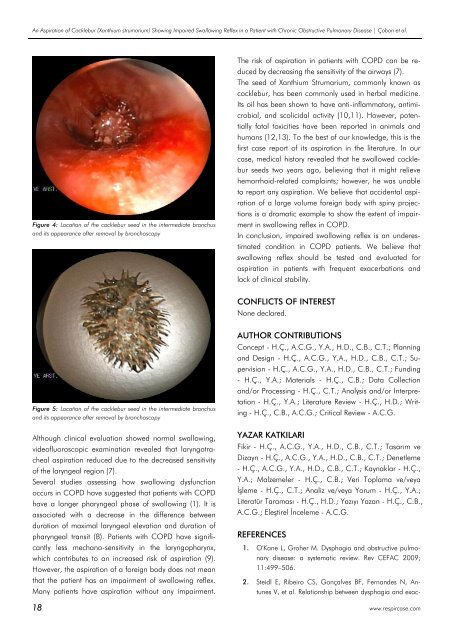Respircase Cilt: 6 - Sayı: 1 Yıl: 2017
Create successful ePaper yourself
Turn your PDF publications into a flip-book with our unique Google optimized e-Paper software.
An Aspiration of Cocklebur (Xanthium strumarium) Showing Impaired Swallowing Reflex in a Patient with Chronic Obstructive Pulmonary Disease | Çoban et al.<br />
Figure 4: Location of the cocklebur seed in the intermediate bronchus<br />
and its appearance after removal by bronchoscopy<br />
The risk of aspiration in patients with COPD can be reduced<br />
by decreasing the sensitivity of the airways (7).<br />
The seed of Xanthium Strumarium, commonly known as<br />
cocklebur, has been commonly used in herbal medicine.<br />
Its oil has been shown to have anti-inflammatory, antimicrobial,<br />
and scolicidal activity (10,11). However, potentially<br />
fatal toxicities have been reported in animals and<br />
humans (12,13). To the best of our knowledge, this is the<br />
first case report of its aspiration in the literature. In our<br />
case, medical history revealed that he swallowed cocklebur<br />
seeds two years ago, believing that it might relieve<br />
hemorrhoid-related complaints; however, he was unable<br />
to report any aspiration. We believe that accidental aspiration<br />
of a large volume foreign body with spiny projections<br />
is a dramatic example to show the extent of impairment<br />
in swallowing reflex in COPD.<br />
In conclusion, impaired swallowing reflex is an underestimated<br />
condition in COPD patients. We believe that<br />
swallowing reflex should be tested and evaluated for<br />
aspiration in patients with frequent exacerbations and<br />
lack of clinical stability.<br />
CONFLICTS OF INTEREST<br />
None declared.<br />
Figure 5: Location of the cocklebur seed in the intermediate bronchus<br />
and its appearance after removal by bronchoscopy<br />
Although clinical evaluation showed normal swallowing,<br />
videofluoroscopic examination revealed that laryngotracheal<br />
aspiration reduced due to the decreased sensitivity<br />
of the laryngeal region (7).<br />
Several studies assessing how swallowing dysfunction<br />
occurs in COPD have suggested that patients with COPD<br />
have a longer pharyngeal phase of swallowing (1). It is<br />
associated with a decrease in the difference between<br />
duration of maximal laryngeal elevation and duration of<br />
pharyngeal transit (8). Patients with COPD have significantly<br />
less mechano-sensitivity in the laryngopharynx,<br />
which contributes to an increased risk of aspiration (9).<br />
However, the aspiration of a foreign body does not mean<br />
that the patient has an impairment of swallowing reflex.<br />
Many patients have aspiration without any impairment.<br />
AUTHOR CONTRIBUTIONS<br />
Concept - H.Ç., A.C.G., Y.A., H.D., C.B., C.T.; Planning<br />
and Design - H.Ç., A.C.G., Y.A., H.D., C.B., C.T.; Supervision<br />
- H.Ç., A.C.G., Y.A., H.D., C.B., C.T.; Funding<br />
- H.Ç., Y.A.; Materials - H.Ç., C.B.; Data Collection<br />
and/or Processing - H.Ç., C.T.; Analysis and/or Interpretation<br />
- H.Ç., Y.A.; Literature Review - H.Ç., H.D.; Writing<br />
- H.Ç., C.B., A.C.G.; Critical Review - A.C.G.<br />
YAZAR KATKILARI<br />
Fikir - H.Ç., A.C.G., Y.A., H.D., C.B., C.T.; Tasarım ve<br />
Dizayn - H.Ç., A.C.G., Y.A., H.D., C.B., C.T.; Denetleme<br />
- H.Ç., A.C.G., Y.A., H.D., C.B., C.T.; Kaynaklar - H.Ç.,<br />
Y.A.; Malzemeler - H.Ç., C.B.; Veri Toplama ve/veya<br />
İşleme - H.Ç., C.T.; Analiz ve/veya Yorum - H.Ç., Y.A.;<br />
Literatür Taraması - H.Ç., H.D.; Yazıyı Yazan - H.Ç., C.B.,<br />
A.C.G.; Eleştirel İnceleme - A.C.G.<br />
REFERENCES<br />
1. O'Kane L, Groher M. Dysphagia and obstructive pulmonary<br />
disease: a systematic review. Rev CEFAC 2009;<br />
11:499–506.<br />
2. Steidl E, Ribeiro CS, Gonçalves BF, Fernandes N, Antunes<br />
V, et al. Relationship between dysphagia and exac-<br />
18 www.respircase.com

















